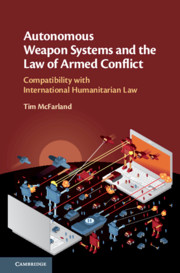 Autonomous Weapon Systems and the Law of Armed Conflict
Autonomous Weapon Systems and the Law of Armed Conflict Book contents
- Autonomous Weapon Systems and the Law of Armed Conflict
- Autonomous Weapon Systems and the Law of Armed Conflict
- Copyright page
- Contents
- Figures and Tables
- Acknowledgements
- 1 Introduction
- 2 Legal Background
- 3 Understanding Weapon Autonomy
- 4 Identifying Legal Issues
- 5 Weapons Law
- 6 Targeting Law
- 7 Accountability
- 8 Recommendations
- Index
5 - Weapons Law
Published online by Cambridge University Press: 17 June 2020
- Autonomous Weapon Systems and the Law of Armed Conflict
- Autonomous Weapon Systems and the Law of Armed Conflict
- Copyright page
- Contents
- Figures and Tables
- Acknowledgements
- 1 Introduction
- 2 Legal Background
- 3 Understanding Weapon Autonomy
- 4 Identifying Legal Issues
- 5 Weapons Law
- 6 Targeting Law
- 7 Accountability
- 8 Recommendations
- Index
Summary
This chapter discusses the law governing the nature and design of weapons as it relates to autonomous weapon systems. It is presented in three parts. The first part covers prohibitions and restrictions on specific types of weapons. At present there is no law directed specifically at autonomous weapon systems, but it is conceivable that autonomous capabilities may be added to types of weapons that are subject to special regulation; the permissibility and effects of such development are considered. The second part discusses requirements imposed on weapons by general rules of IHL based on their nature and intended use. The fundamental principles of distinction and the avoidance of superfluous injury and unnecessary suffering are most at issue here. The main finding of this part is that an expanded understanding of ‘accuracy’ is required in order to effectively apply the principle of distinction to autonomous weapons. The third part discusses the Martens Clause, finding that, whether a broad or narrow interpretation of the Clause is adopted, it does not, at present, inhibit development or use of autonomous weapons.
- Type
- Chapter
- Information
- Autonomous Weapon Systems and the Law of Armed ConflictCompatibility with International Humanitarian Law, pp. 88 - 112Publisher: Cambridge University PressPrint publication year: 2020


